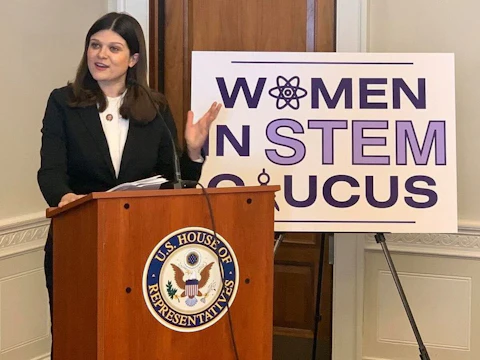A new federal program is helping struggling Michiganders get broadband connections by paying some of the cost.
WYOMING, Mich.—For a lot of Michiganders, the internet divide takes the form of digital deserts where broadband service simply is not available in rural communities. But many more are in digital oceans—water, water everywhere and not a drop to drink.
The coronavirus pandemic brought both forms of the divide into crystal-clear focus, especially for schools who had to ensure students could still learn when quarantined, as Kevin Polston, superintendent of Godfrey-Lee Public Schools in Wyoming explained to MLive.
“Having internet access so that children can learn while at home is critical to our operation,” Polston said. “The cost to internet may be as little as $10 a month, but that’s still $10 that a family isn’t spending on food or medicine or other basic needs for their family.”
And that $10 is a big deal in Polston’s district, where 95% of students come from economically disadvantaged backgrounds and 6% of families are unhoused. And the last option for those families to do things like attend class, access government services or pay bills were libraries, which also closed due to the coronavirus.
RELATED: ‘It Opened the World to Us’: Broadband Infrastructure Can Transform Rural Michigan Life
“The pandemic has exacerbated existing inequities,” Polston said. “COVID and its impact has been more profound in communities of color, and we’re going to make sure their children have access to everything they need to learn at high levels.”
Getting internet to students traditionally without due to financial or geographic restraints has been one of the great challenges of the coronavirus pandemic. Some school districts, like Kalamazoo, deployed Wi-Fi hotspots throughout the community. Others, like Detroit, gave out laptops and internet access. Polston’s district is taking advantage of a program giving families Wi-Fi hotspots.
Making Broadband More Affordable
A new opportunity has become available, too. The Emergency Broadband Benefit, a new program from the Federal Communications Commission (FCC), offers discounts of $50 to qualifying Michiganders. It also offers up to $75 for indigenous Michiganders on tribal lands, which have, nationwide, lack access to the internet at four times the national average rate.
Michigan families are eligible if one member of the household meets at least one of the following:
- Has an income that is at or below 135% of the Federal Poverty Guidelines or participates in certain assistance programs, such as SNAP, Medicaid or the FCC’s Lifeline program;
- Approved to receive benefits under the free and reduced-price school lunch program or the school breakfast program, including through the USDA Community Eligibility Provision, in the 2019-2020 or 2020-2021 school year;
- Received a Federal Pell Grant during the current award year;
- Experienced a substantial loss of income through job loss or furlough since February 29, 2020 and the household had a total income in 2020 at or below $99,000 for single filers and $198,000 for joint filers; or
- Meets the eligibility criteria for a participating provider’s existing low-income or COVID-19 program.
SEE ALSO: How Rosemary Bayer Went From Computer Scientist to State Senator
Lt. Gov. Garlin Gilchrist has been championing the program in Michigan and encourages Michiganders to use that help to get connected to the new infrastructure of the modern age.
“I’m committed to making sure that we level the playing field so that everyone in our state has an equal opportunity to take advantage of online resources and participate fully in our society and economy,” said Gilchrist. “We are working on getting the word out about the Emergency Broadband Benefit program to both broadband providers and residents across Michigan to ensure that every eligible household in our state has an opportunity to take advantage of this tremendous federal resource.”
A Larger Solution for a Massive Problem
More support might still be on the way. The American Jobs Plan proposed by President Joe Biden includes a massive effort to make broadband internet available, affordable, and reliable nationwide. He also wants the effort to be ready for an even more interconnected future.
In fact, the plan is intentionally designed to parallel the revolutionary and essential nature of high-speed internet by comparing it to the revolution brought by home electricity. The proposal is meant to mirror the Rural Electrification Act from the Great Depression that increased access of power lines to farm lands and rural populations.
That might seem dramatic, until the sheer size and consequence of the problem is considered.
READ MORE: Thousands of Michigan Households Don’t Have Access to Internet. Here’s Where It’s Worst
“With children learning online and parents working from home, the COVID-19 pandemic has highlighted just how great the need for reliable and affordable high-speed internet access is in Michigan, just as it is everywhere in our country,” said Lt. Governor Garlin Gilchrist. “Internet service is no longer a luxury, it’s a necessity.”
The scale of the problem can be seen in detail in Detroit. Only one in five Detroiters in the 48208 ZIP code uses the internet from home at broadband speeds, according to data gathered by Microsoft in October 2020. While nearly everyone in 48206 had broadband speeds, broadband access was comparatively vanishingly rare elsewhere, with only 14% of Detroiters able to access broadband in 48201.
And that kind of digital divide has a profound impact on students, according to a study fr4om Michigan State University. Keith Hampton, a Michigan State University professor of media and information, told City Pulse about the findings. It’s a topic he’s kept an eye on for a while.
“Students without internet access and low digital skills have substantially lower grade point averages,” said Hampton. “Students who have internet access only through cell phones do as bad or even worse than students who have no access at all.”





